The scientific name of cabbage is Brassica oleracea var. capitata. Cauliflower is the highly modified form of cabbage in the mustard family. It is native to Western Europe and Southern Europe. It is thought to have been first grown by the Greeks for medicinal purposes over 3000 years ago. Cabbage is believed to first appear in England in the 14th century. It is grown as an annual vegetable crop for its dense leaved heads.
Color: leafy green or white plant. However, beautiful red or purple colors were also observed
Shape: tightly bound and usually spherical
Size: head average between 0.5 and 4kg with fast-growing, plants are 40-60 cm tall in their first year at the mature vegetative stage
Flavor: sweet, fruity, and rich flavor but sometimes it can be bitter, musty, and flat. Fresh cabbage flavor is more complex than expected
Nutrients
Cabbage has an impressive nutrient profile and contains several other micronutrients including vitamin A, iron, and riboflavin. It is high in fiber and contains powerful antioxidants. Cabbage is high in vitamin C, a potent antioxidant that may protect against heart disease vision loss, and certain cancers. One cup or 89 grams of raw green cabbage contains
- Calories 22
- Proteins 1 g
- Fiber 2 g
- Vitamin 36% of the daily value
- Manganese 6% of the daily value
- Vitamin B6 6% of the daily value
- Calcium 3% of the daily value
- Potassium 3% of the daily value
- Magnesium 3% of the daily value
| How to grow Cabbage? |
Healthy Benefits of Cabbage
Like other plant foods, cabbage is also considered a healthy food. In addition, cabbage has many other health benefits.
Improves digestion
Cabbage improves your digestive health, is a gut-friendly insoluble fiber is a type of carbohydrate that can’t be broken down in the intestines. Insoluble fiber helps keep the digestive system healthy by adding bulk to stool and promoting regular bowel movements. Rich in insoluble fiber is shown to increase the number of beneficial bacteria in the gut.
Healthy heart
Anthocyanins are plant pigments that belong to the flavonoid family. A higher intake of anthocyanin-rich foods had a lower risk of a heart attack. Cabbage contains more than 36 different kinds of potent anthocyanin, making it an excellent choice for heart health.
Lower blood pressure
Potassium is an important mineral and electrolyte that the body needs to function properly. Potassium helps excrete excess sodium through urine. It also relaxes blood vessel walls, which lowers blood pressure. Eating more potassium-rich cabbage is a delicious way to lower high blood pressure and may help keep it within a healthy range.
Lower cholesterol
Cholesterol is a waxy substance that is fat-like and found in every cell in your body. Cholesterol is also essential for proper body functioning. Proper digestion and synthesis of hormones and Vitamin D require cholesterol. People having high cholesterol level tends to have an increased risk of heart disease, especially when they have levels of LDL (bad) cholesterol. Cabbage is two substances that aid in decreasing levels of LDL.
Keep Inflammation Check
Cabbage helps inflammation check in by protecting against infection or speeding up healing. Cabbage is a cruciferous vegetable that contains different types of antioxidants that helps in reducing chronic inflammation. The only vegetable that aids in reducing the blood markers of inflammation is cruciferous vegetables including cabbage.
Rich in Vitamin C
Vitamin C is a water-soluble vitamin that serves many important roles in the body. It is also termed ascorbic acid. Vitamin C protects our body from damage caused by the free radicals. Vitamin C-rich food is associated with a lower risk of cancer, especially lung cancer.
Side Effects of Cabbage
Eating a large quantity of cabbage can cause negative side effects such as hypothyroidism, diarrhea, and flatulence. Cabbage is commonly a gas-producing vegetable. Cabbage often has a difficult time digesting. Eating too much cabbage can cause bloating.
FAQ
What is the benefit of eating cabbage?
Cabbage has an impressive nutrient profile. It contains several other micronutrients including vitamin A, iron, and riboflavin. It is high in fiber and contains powerful antioxidants. Cabbage improves your digestive health, lower blood pressure, and cholesterol, and has many other benefits.
Is it better to eat cabbage raw or cooked?
Even if the contents alter when it is cooked or fermented, Raw cabbage in particular might give you the best nutritional boost per serving when eaten raw.
What is the benefit of purple cabbage?
Purple cabbage, also called red cabbage, tastes similar to green cabbage. This purple variety is linked to health benefits such as stronger bones and a healthier heart. Purple cabbage also lowers inflammation.






